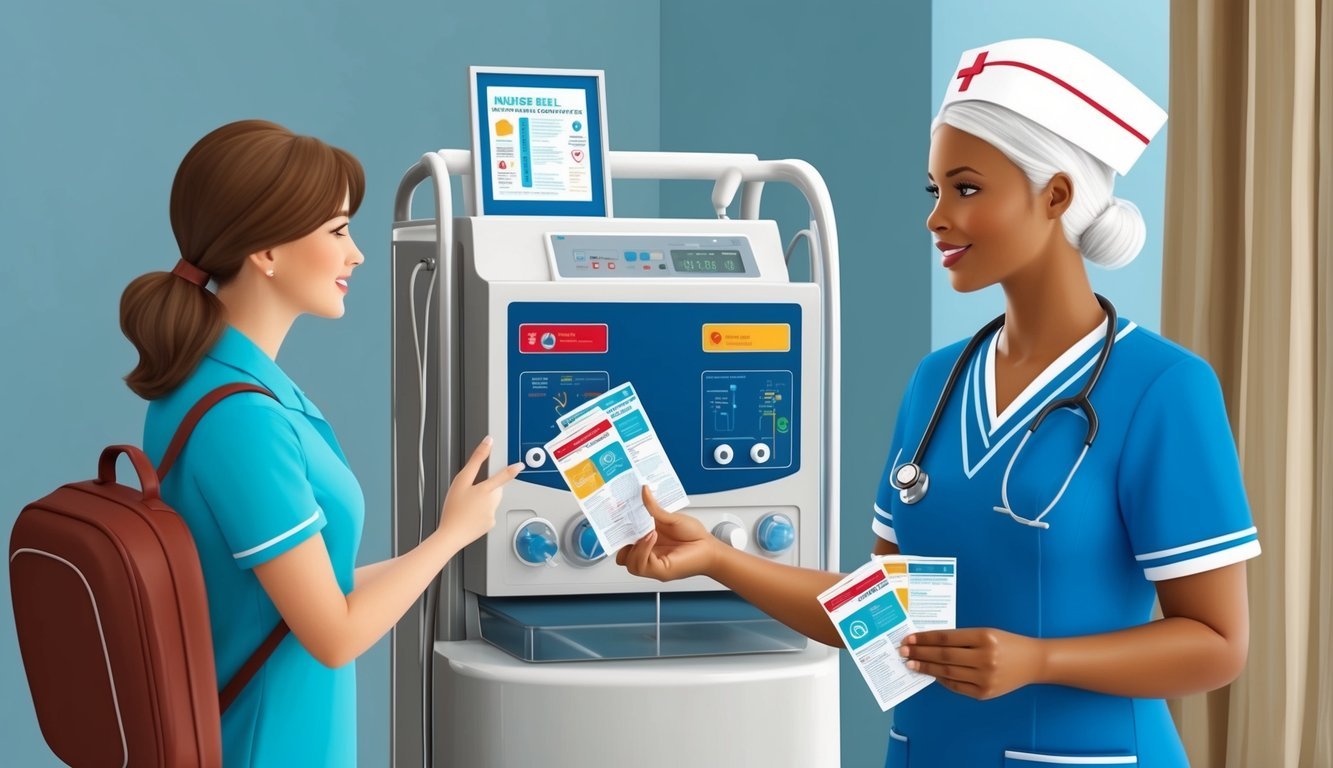Becoming a dialysis nurse can be a fulfilling career choice for those interested in helping patients with kidney problems.
To become a dialysis nurse, you typically need to complete nursing school and obtain certification in nephrology nursing.
The role involves working closely with patients undergoing dialysis treatment, which requires specialized skills and knowledge.
This career not only offers a chance to make a real difference in patients’ lives but also provides various job opportunities in healthcare settings.

As the demand for dialysis services increases, so does the need for qualified dialysis nurses.
Pursuing this path can lead to steady job growth and a competitive salary.
With the right education and training, you can stand out in this vital field of nursing.
Key Takeaways
- Education and certification are essential steps to becoming a dialysis nurse.
- Practical training boosts your skills and job readiness.
- The growing demand for dialysis services opens various employment opportunities.
Understanding the Role of a Dialysis Nurse
As a dialysis nurse, you play a vital role in the care and treatment of patients with kidney disease.
This involves various responsibilities that focus on patient safety, effective treatment administration, and collaboration with healthcare teams.
Responsibilities and Scope of Practice
Your primary responsibility is to provide care to patients undergoing dialysis.
This includes monitoring vital signs and assessing the patient’s condition before, during, and after treatments.
You must be skilled in operating dialysis machines and recognizing complications that may arise during procedures.
Key responsibilities include:
- Patient Assessment: Evaluating patients for potential health issues.
- Dialysis Treatment Administration: Performing hemodialysis or peritoneal dialysis, depending on patient needs.
- Patient Education: Teaching patients about their treatment options, including lifestyle changes and disease management.
According to NurseJournal, you must also maintain detailed records of treatments and collaborate with other healthcare providers for comprehensive patient care.
Dialysis Treatments and Patient Care
You will administer two main types of dialysis: hemodialysis and peritoneal dialysis.
Hemodialysis typically occurs in a clinic setting, using a machine to filter waste from the blood.
Peritoneal dialysis can be done at home, using the lining of the abdomen for filtration.
During treatments, your duties include:
- Monitoring for Complications: Watching for issues such as low blood pressure or signs of infection.
- Emotional Support: Providing emotional care, ensuring patients understand their treatment and encouraging questions.
- Follow-Up Care: Conducting post-treatment assessments to monitor recovery and any side effects.
The demand for skilled dialysis nurses is expected to grow as kidney disease rates rise, making this a rewarding career choice.
For more information on the career path, visit Nurse.org.
Educational Pathway to Becoming a Dialysis Nurse
To become a dialysis nurse, you need to complete specific educational steps.
This involves obtaining a nursing degree and obtaining the necessary licensure to practice as a registered nurse.
Nursing Degree Programs
You can choose between two main nursing degree programs: the Bachelor of Science in Nursing (BSN) and the Associate Degree in Nursing (ADN).
| Degree Type | Duration | Description |
|---|---|---|
| BSN | 4 years | A comprehensive program that includes advanced nursing topics, research, and leadership. It is often preferred by employers. |
| ADN | 2 years | A quicker option focusing on essential nursing skills, preparing you for entry-level positions. |
Completing either program will qualify you to take the NCLEX-RN exam, which is required for licensure.
Licensure as a Registered Nurse
Once you have your nursing degree, the next step is to obtain your RN licensure.
You must pass the NCLEX-RN exam to demonstrate your knowledge and skills.
After passing the exam, you can apply for licensure in your state.
Each state may have different requirements, so check your state board of nursing for specifics.
With your RN license, you are eligible to work in various healthcare settings, including dialysis centers, where specialized training will further enhance your skills.
Specialized Training and Certification
To excel as a dialysis nurse, obtaining specialized training and the right certifications is essential.
This training enhances your skills in nephrology nursing, making you more effective in patient care.
Certification through NNCC
The Nephrology Nursing Certification Commission (NNCC) offers valuable certifications, such as the Certified Dialysis Nurse (CDN) and Certified Nephrology Nurse (CNN).
These credentials validate your expertise and commitment to nephrology nursing.
To gain certification, you must meet specific criteria, including:
- Education: Hold a valid nursing license.
- Experience: Have at least 2,000 hours of nephrology nursing practice within the last two years.
- Examination: Pass a certification exam that covers various topics in renal care.
Certification enhances your career prospects and reassures patients of your competence.
For more information, visit NNCC’s official website.
Continuing Education Requirements
Once certified, you must maintain your credentials through ongoing education.
The NNCC requires you to complete 30 hours of continuing education every three years.
This education should focus on nephrology topics.
You can meet these requirements through:
- Workshops: Attend in-person or online workshops focusing on renal care.
- Conferences: Participate in conferences related to nephrology nursing.
- Online Courses: Enroll in courses that provide relevant content.
It is important to keep track of your education hours to ensure your certification remains active.
This commitment to learning helps you provide the best care for your patients.
More details can be found on continuing education options.
Career Development and Advancement
As a dialysis nurse, there are various pathways for career growth and specialization.
You can enhance your skills and qualifications through focused training and advanced degrees, leading to roles with greater responsibilities.
Specializing in Nephrology Nursing
Specializing in nephrology nursing allows you to deepen your expertise.
You can obtain certification as a Certified Nephrology Nurse (CNN) through the Nephrology Nursing Certification Commission (NNCC).
This credential boosts your credibility and job prospects.
Key steps to specialize:
- Gain experience: Work in dialysis units and related settings.
- Continuing education: Attend workshops and seminars on nephrology topics.
- Certification: Consider additional certifications like Certified Nephrology Nurse Practitioner (CNP) for expanded roles.
The advanced knowledge of kidney disease management makes you a valuable asset to healthcare teams.
This can open doors to positions such as Clinical Nurse Specialist or advanced roles in nephrology.
Advanced Practice Nursing Roles
Pursuing advanced practice roles can significantly elevate your career.
You may choose to become a Nurse Practitioner (NP) specializing in nephrology, requiring a Master’s of Science in Nursing (MSN) degree.
Possible advanced roles include:
- Nurse Manager: Oversee dialysis units, manage staff, and ensure quality care.
- Nurse Educator: Train future nurses on nephrology care and dialysis procedures.
Advanced education not only supports your career development but also enables you to take on leadership roles.
You can influence patient care practices and mentor junior staff, making a notable impact in the field.
Employment Opportunities and Settings

As a dialysis nurse, you have various employment opportunities across different healthcare environments.
Your role is crucial in both acute and chronic care settings, addressing the needs of patients with kidney issues.
Working in Various Healthcare Environments
You can find dialysis nurses working in several settings, including:
- Dialysis Clinics: These centers focus on outpatient care for patients requiring regular dialysis treatments.
- Outpatient Clinics: Here, nurses work with patients with chronic kidney disease (CKD) and monitor their progress.
- Acute Care Hospitals: In this environment, you assist patients facing immediate kidney failure or require urgent dialysis.
- Transplant Centers: You may also support transplant coordinators, helping manage patients awaiting kidney transplants.
Each setting demands unique skills, and your experience will guide which environment suits you best.
The Role of Dialysis Nurses in Acute and Chronic Care
In acute care, you manage patients with End-Stage Renal Disease (ESRD) who need immediate interventions.
This role includes:
- Monitoring vital signs
- Preparing patients for dialysis
- Collaborating with physicians for treatment plans
You must be prepared for fast-paced situations, offering critical care support.
In chronic care, your duties involve long-term patient management.
Here, you will:
- Educate patients on self-care practices
- Conduct routine assessments
- Support them emotionally throughout their treatment journey
Both roles are vital in improving patient outcomes and enhancing the quality of life for those with kidney issues.
Your expertise helps ensure that patients receive the best care possible in all circumstances.
Frequently Asked Questions

Becoming a dialysis nurse involves specific qualifications, training, and certifications.
Here are some common questions that many people have about this career path.
What qualifications are required to become a dialysis nurse?
To pursue a career as a dialysis nurse, you need to complete a nursing program.
This can be an Associate Degree in Nursing (ADN) or a Bachelor of Science in Nursing (BSN).
After graduation, you must pass the NCLEX-RN exam to become a registered nurse.
What is the typical timeframe for training to become a dialysis nurse?
The typical training period varies.
If you are pursuing an ADN, it usually takes about two years, while a BSN typically takes four years.
After obtaining your degree, you may also need additional training in nephrology nursing.
Are there special certifications needed to practice as a dialysis nurse?
Yes, obtaining certification can enhance your qualifications.
Many dialysis nurses pursue the Certified Dialysis Nurse (CDN) credential.
This certification demonstrates expertise and may require specific experience and passing an exam.
What is the average salary for a dialysis nurse in the United States?
The average salary for a dialysis nurse varies by location.
Generally, the salary ranges from $70,000 to $90,000 per year.
However, with experience and additional certifications, some nurses may earn more.
What steps should be taken to pursue a career as a dialysis Nurse Practitioner?
To become a Nurse Practitioner in dialysis, you first need to complete a BSN program.
Next, you must gain experience in nursing.
After that, you should earn a Master of Science in Nursing (MSN) with a focus on nephrology.
Finally, you can seek certification as a Nurse Practitioner.
What are the challenges commonly faced by dialysis nurses in their profession?
Dialysis nurses often face challenges such as managing patient workloads and dealing with emotional stress.
They must also handle technical tasks and ensure patient safety during dialysis treatments.
Building strong relationships with patients is essential but can be demanding over time.

